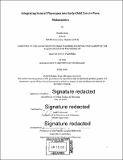Integrating natural playscapes into early-child care in Pune, Maharashtra
Author(s)
Shah, Riddhi (Riddhi Pankaj)
DownloadFull printable version (30.41Mb)
Other Contributors
Massachusetts Institute of Technology. Department of Urban Studies and Planning.
Advisor
James Wescoat
Terms of use
Metadata
Show full item recordAbstract
Globally, more people live in urban areas than in rural areas. As cities grow and urban areas expand, rural villages are facing a unique problem of experiencing an in-between state identified as Peri-Urban. In these geographies, an increasing number of children are growing up without access to basic amenities like playgrounds. This thesis is an exploration of integrating playful landscapes into early childcare experience by analyzing the anganwadi model in India. While the importance of education in Indian society is undisputed, there is a lack of awareness about engaging children with their immediate surroundings through play. Play is essential to a country's development because it contributes to the cognitive, physical, social, and emotional well-being of children. However, there is no theoretical understanding of a construct such as child friendly playscapes in Peri-Urban areas which fall under rural governance but face urban problems. An in-depth analytic study was conducted in Khanapur village in Haveli Taluka, Pune District, India, with children in the age group of 0 to 6 years to validate the above proposition. The study used four kinds of data: interviews, first hand observations, drawings by children, and archival documents. Research showed that Peri-Urban areas have an abundance of natural resources but with increasing vehicular movement and real-estate development, safety issues and land-crunch have affected outdoor free play activities. The thesis discusses the importance of overcoming religious and social beliefs to use the existing network of temples, shopfronts, medical centres and natural habitats to enhance the play experience. This led to the development of a framework at village and district to propose playscapes using natural materials at a multi-scalar level: 1) Anganwadi design 2) Streetscapes 3) Communityscapes 4) Regionscapes. The framework provides a set of urban design guidelines, programs and recommends changes to the land-reservation and acquisition process under the Integrated Child Development Services (ICDS) scheme. The design guidelines provide easy low-cost solutions using community participation to empower the anganwadi workers and caregivers. The local planning agencies may use these recommendations to develop an all-inclusive development plan which ensures that every child has access to his fundamental right to play spatially and not only virtually through digital tools. This thesis offers solutions to safeguard the quality of life for children in India's Peri-Urban areas which are in a state of flux. Keywords: Place making, early-childcare, landscape, Peri-Urban development.
Description
Thesis: M.C.P., Massachusetts Institute of Technology, Department of Urban Studies and Planning, 2018. Cataloged from PDF version of thesis. Includes bibliographical references (pages 138-142).
Date issued
2018Department
Massachusetts Institute of Technology. Department of Urban Studies and PlanningPublisher
Massachusetts Institute of Technology
Keywords
Urban Studies and Planning.